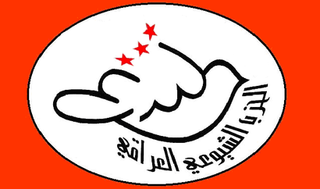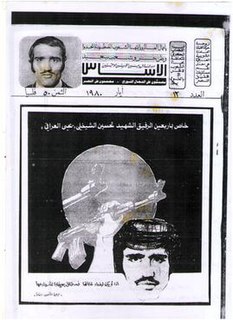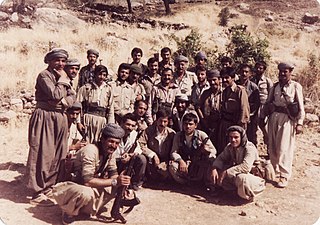Ila al-Amam (Arabic : إلى الأمام, 'Forward') was a communist group in Iraq, known by the publication it issued under that name. The group publishing Ila al-Amam had been expelled from the Iraqi Communist Party in August 1942, after which they founded Ila al-Amam. The main leaders of the group were Thunun Ayub ('Qadir') and Yaqub Cohen ('Fadil'). Inside the Communist Party, Ayub had been a Central Committee member but had developed personal differences with the Communist Party general secretary Fahd. [1]

Iraq, officially the Republic of Iraq, is a country in Western Asia, bordered by Turkey to the north, Iran to the east, Kuwait to the southeast, Saudi Arabia to the south, Jordan to the southwest and Syria to the west. The capital, and largest city, is Baghdad. Iraq is home to diverse ethnic groups including Arabs, Kurds, Assyrians, Turkmen, Shabakis, Yazidis, Armenians, Mandeans, Circassians and Kawliya. Around 95% of the country's 37 million citizens are Muslims, with Christianity, Yarsan, Yezidism and Mandeanism also present. The official languages of Iraq are Arabic and Kurdish.

The Iraqi Communist Party is a communist party and the oldest active party in Iraq. Since its foundation in 1934, it has dominated the left in Iraqi politics. It played a prominent role in shaping the political history of Iraq between its foundation and the 1970s. The Party was involved in many of the most important national uprisings and demonstrations of the 1940s and 1950s. It suffered heavily under the Ba'ath Party and Saddam Hussein but remained an important element of the Iraqi opposition and was a vocal opponent of the United Nations sanctions imposed on Iraq after the Gulf War of 1991. It opposed the United States invasion of Iraq in 2003 but since then has participated in the new political institutions. It received little support in the Iraqi general elections of 2005. The party reportedly gained some seats in each province in which the 2013 Iraqi governorate elections were held. The party joined the newly established Sairoun Alliance in the 2018 parliamentary elections, who gained the highest number of votes and a total of 54 seats in the Iraqi parliament. A communist woman representing the alliance, Suhad al-Khateeb, was also elected in the elections to represent the city of Najaf, deemed to be one of the holiest religious and conservative cities in Iraq. Al-Khateeb, who is a teacher and an anti-poverty and women's rights activist, said upon her victory "the Communist party have a long history of honesty – we were not agents for foreign occupations. We want social justice, citizenship, and are against sectarianism, and this is also what Iraqis want."
Central Committee is the common designation of a standing administrative body of communist parties, analogous to a board of directors, whether ruling or non-ruling in the 20th century and of the surviving communist states in the 21st century. In such party organizations the committee would typically be made up of delegates elected at a party congress. In those states where it constituted the state power, the Central Committee made decisions for the party between congresses, and usually was responsible for electing the Politburo. In non-ruling Communist parties, the Central Committee is usually understood by the party membership to be the ultimate decision-making authority between Congresses once the process of democratic centralism has led to an agreed-upon position.
The Ila al-Amam suffered heavily from state repression. In September 1944 the Ila al-Amam group merged with the Shararah group, forming the Wahdat an-Nidal . [2]
Shararah is a village in west-central Yemen. It is located in the San‘a’ Governorate.
Wahdat an-Nidal was a communist group in Iraq, known by the publication it issued under that name in Arabic and Kurdish. The group emerged in September 1944 through the merger of the Ila al-Aman and Shararah factions.

